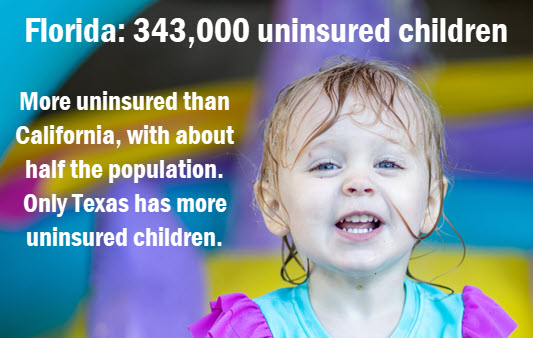Florida: More Uninsured Children Than California, 55,000 Added to FL's Uninsured Since 2016
Posted October 10, 2020 01:50 am

Photo: Jeremiah Lawrence/Unsplash | Columbia
County Observer Graphic
ORLANDO, FL – Florida had an estimated 343,000 uninsured children in 2019, the second-highest number in the country, according to a new report by the Georgetown University Center for Children and Families (CCF). That's up from an estimated 288,000 in 2016, meaning the state has seen a 19.1 percent increase in the number of children without health coverage over three years.
 Florida
now has more uninsured children than
California, with nearly twice the
population.
Florida
now has more uninsured children than
California, with nearly twice the
population.
The child uninsured rate for all children in Florida rose from 6.6 percent in 2016 to 7.6 percent in 2019, more than double Alabama's.
The uninsured rate for Latinx children in Florida is even higher at 9.2 percent. The report cited a "chilling effect" of the Trump Administration’s public charge regulation as one of the causes of the increase.
Texas is the only state in the country with more uninsured children than Florida. Together, Texas and Florida make up 41 percent of the children nationwide who have become uninsured over the three-year period. Three Florida counties — Broward, Miami-Dade, and Palm Beach — rank among the 20 counties with the highest number of uninsured children nationwide.
It's very alarming, though not surprising, given the Administration's push to dismantle the Affordable Care Act (ACA). The number of uninsured Florida kids was rising even before COVID-19 hit. Now, during the pandemic, Florida children are particularly at risk of being uninsured, as families continue grappling with joblessness and the loss of employer-sponsored coverage.
Many organizations believe the need has never been greater for Florida lawmakers to expand Medicaid coverage to all low income adults.
Scott Darius, executive director of Florida Voices for Health, said, “It's clear that Florida needs to work harder to get our children into coverage. When children are covered, they miss fewer days of school, and parents miss fewer days of work."
Alison Yager, deputy executive director of Florida Health Justice Project, said, "Florida's children are a chief casualty of partisan policies that have stripped resources from the systems meant to help people navigate the health coverage system, and that have alienated too many immigrant families from publicly-funded health coverage. In the context of a devastating pandemic, and historic levels of unemployment, we must take affirmative steps to ensure that all of Florida's children, as well as their parents, have health coverage.”
Florida’s experience is part of a national trend that left an estimated 726,000 more children without health coverage nationwide from 2016 to 2019. Much of the coverage gains from the ACA for children have now been eliminated.
The increase in the number and rate of uninsured children occurred before the pandemic and associated economic downturn and is largely attributable to losses or avoidance of public coverage – primarily Medicaid and the Children's Health Insurance Program, noted CCF. The situation has most likely deteriorated in 2020 for children as their parents lost their jobs and health coverage this year. However, there is still no reliable data to estimate the extent of these coverage losses.
Joan Alker, Executive Director of the CCF and lead author of the report, said, “This damaging trend will have long-term consequences for children and communities across Florida, as without health coverage, children cannot access the care they need to grow and thrive.”
The experience in states that expanded Medicaid is that when parents gain health coverage, their children are more likely to have coverage. The whole family has better financial security.
Research shows children with health coverage are more likely to graduate from high school, attend college, and grow up to be healthier and more productive adults.
The need for Florida lawmakers to expand Medicaid coverage to all adults with low income has never been greater.
---
Sadaf Knight has over 11 years of experience in public policy research, advocacy and nonprofit management. She is CEO of Florida Policy Institute
Florida Policy Institute is an independent, nonpartisan and nonprofit organization dedicated to advancing state policies and budgets that improve the economic mobility and quality of life for all Floridians.

 By
Sadaf Knight
By
Sadaf Knight